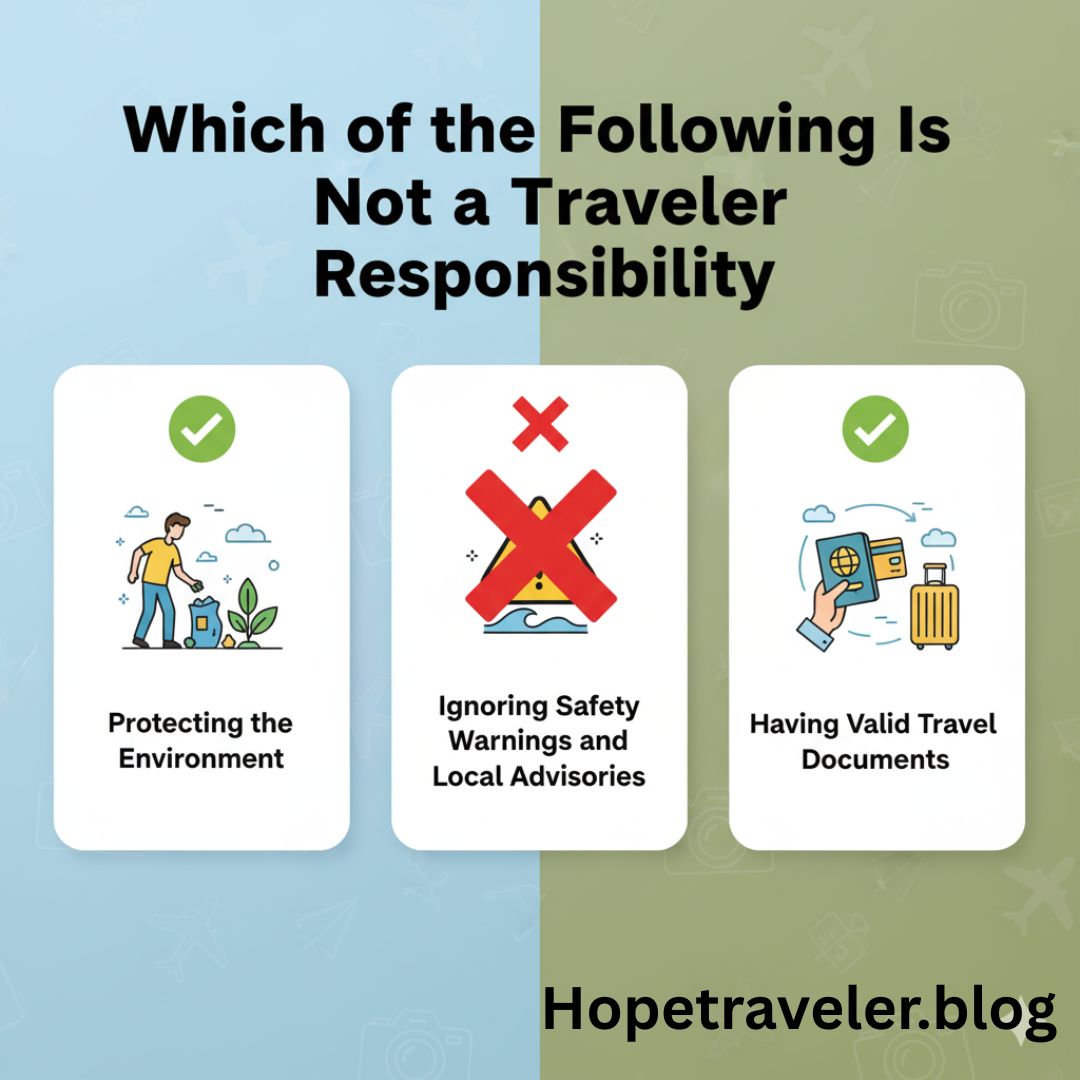Traveling comes with excitement, exploration, and adventure, but it also carries a set of responsibilities. Whether you are a tourist, a business traveler, or a student abroad, certain rules and duties help ensure safe and respectful travel. Many new travelers often wonder: Which of the following is not a traveler responsibility?
The answer requires understanding what traveler responsibilities really mean. According to Wikipedia, travel refers to the movement of people between distant geographical locations, and during such journeys, travelers are expected to follow specific norms, laws, and ethical practices. However, not every action is part of a traveler’s duty. Let’s break this down in detail.
What Are Traveler Responsibilities?
Traveler responsibilities refer to the duties and behaviors expected from anyone visiting another place. These responsibilities are designed to protect the traveler, respect local communities, and preserve cultural and natural heritage. They include:
- Following laws and regulations of the host country
- Respecting local traditions and cultures
- Maintaining health and safety standards
- Ensuring financial and travel document security
- Being environmentally conscious
Understanding these responsibilities helps travelers enjoy safe and meaningful trips.
Common Responsibilities of a Traveler
1. Following Local Laws
Travelers are expected to obey the laws of the country they are visiting. Ignorance of the law is not an excuse, and violations can lead to fines or imprisonment.
2. Respecting Culture and Traditions
Cultural sensitivity is key. Dressing appropriately, respecting religious sites, and understanding social norms are all part of a traveler’s duty.
3. Keeping Travel Documents Secure
Passports, visas, and identification documents must be kept safe. Losing them can cause serious issues during international travel.
4. Health and Safety Awareness
Travelers should be aware of vaccinations, food safety, and local health risks. Protecting personal health is both a responsibility and a necessity.
5. Environmental Responsibility
Minimizing waste, conserving resources, and avoiding damage to natural sites are important responsibilities. Travelers should leave destinations as beautiful as they found them.
6. Financial Responsibility
Carrying enough funds, budgeting wisely, and being cautious with money are crucial duties. Relying on others for financial support is not considered responsible travel.
Examples of Responsibilities That Belong to Travelers
- Carrying valid identification documents
- Securing travel insurance for emergencies
- Respecting the rights of locals and other travelers
- Avoiding illegal activities like smuggling or vandalism
- Learning basic phrases in the local language for communication
Each of these reflects the common responsibilities that ensure smooth travel experiences.
Which of the Following Is Not a Traveler Responsibility?
To identify what is not a responsibility, we need to differentiate between what is expected of travelers and what is not.
For example:
- Traveler Responsibilities: Following laws, respecting culture, ensuring safety, carrying documents.
- Not a Traveler Responsibility: Expecting locals to adjust to your culture, demanding special treatment, or assuming that the host country must change its practices to suit visitors.
In short, it is not a traveler’s responsibility to alter local customs or expect exceptions to rules simply because they are tourists.
Why Misunderstanding Responsibilities Can Be Risky
Many travel conflicts occur because visitors misunderstand their role. Common issues include:
- Disrespecting sacred sites by taking prohibited photos
- Ignoring visa requirements or overstaying permits
- Littering or damaging natural habitats
- Assuming local people must speak the traveler’s language
Such actions harm the reputation of tourists and can create tension between visitors and locals.
Ethical Responsibilities vs. Legal Responsibilities
It’s important to note the difference:
- Legal Responsibilities: Laws that must be followed, such as visa regulations, driving rules, and customs declarations.
- Ethical Responsibilities: Courtesy, cultural respect, and sustainability practices that may not be legally enforced but are morally expected.
Failing in either category affects the traveler’s image and the overall travel experience.
Case Studies: Traveler Responsibilities in Action
Case 1: Environmental Impact
A traveler hiking in the Himalayas who leaves behind plastic bottles is failing their responsibility to protect the environment.
Case 2: Cultural Sensitivity
A tourist visiting a mosque who ignores dress codes may offend locals, showing a lack of responsibility.
Case 3: Legal Duty
A traveler who overstays their visa in Europe is breaking immigration law, a serious violation of responsibility.
These examples highlight how responsibilities shape global travel experiences.
How to Be a Responsible Traveler
- Do Research Before Traveling: Learn about laws, culture, and expectations.
- Pack Thoughtfully: Bring essentials that minimize dependency on local resources.
- Be Respectful: Treat locals with kindness and patience.
- Travel Sustainably: Support eco-friendly businesses and reduce carbon footprint.
- Stay Aware: Keep track of political, health, or safety advisories in the destination.
Misconceptions About Traveler Responsibilities
Some travelers mistakenly believe:
- It is the responsibility of locals to make them feel comfortable.
- They should always receive priority treatment because they bring money.
- Learning local customs is optional.
In truth, these are not traveler responsibilities but rather misconceptions that lead to negative travel experiences.
The Importance of Responsible Travel
Responsible travel ensures:
- Better relationships with host communities
- Personal safety and smoother experiences
- Environmental preservation
- A positive global image of tourism
By understanding what is and isn’t their responsibility, travelers can contribute to sustainable and respectful tourism worldwide.
Conclusion
So, which of the following is not a traveler responsibility?
The answer is that it is not the traveler’s responsibility to change or control the culture, laws, or traditions of the destination they visit. Instead, their duty is to adapt, respect, and comply with the host environment.
Traveler responsibilities include following local laws, respecting traditions, ensuring safety, and traveling sustainably. Misunderstanding these roles can lead to conflicts, fines, or even legal consequences.
In summary, responsible travel is about respecting others, protecting the environment, and safeguarding yourself. Recognizing what belongs to your responsibilities—and what doesn’t—makes every journey smoother, safer, and more meaningful.




